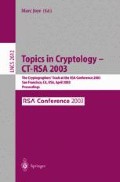Abstract
A proxy signature enables the original signer to delegate her signing capability to a proxy entity, who signs a message on behalf of the original signer. In this paper, we discuss the necessity of a secure channel in proxy signatures. Though establishing a secure channel has much influence on the efficiency of the scheme, to the best of our knowledge, this topic has not been discussed before. All known proxy signatures used a secure channel to deliver a signed warrant except one which used a 3-pass weak blind signature. However, the KPW scheme [2] appeared to be secure without the secure channel. We think that our result can contribute to designing more efficient proxy signature scheme.
Access this chapter
Tax calculation will be finalised at checkout
Purchases are for personal use only
Preview
Unable to display preview. Download preview PDF.
References
Javier Herranz and German Saez “Fully Distributed Proxy Signature Schemes”, http://eprint.iacr.org/, 2002.
S. Kim, S. Park, and D. Won, “Proxy signatures, revisited”, In Pro. of ICICS’97, International Conference in Information and Communications Security, Springer, Lecture Notes in Computer Science, LNCS1334, pages 223–232, 1997. 68, 69, 72
Byoungcheon Lee, Heesun Kim, Kwangjo Kim, “Strong Proxy Signature and its Applications”, SCIS2001, vol 2/2 pp 603–608, Jan.23 26, 2001. 68, 69, 72, 75, 76
Byoungcheon Lee, Heesun Kim, and Kwangjo Kim “Secure Mobile Agent using Strong Non-designated Proxy Signature”, Proc. of ACISP2001, LNCS, Springer Verlag Vol.2119, pp.474–486, 2001.
M. Mambo, K. Usuda, and E. Okamoto, “roxy signature: Delegation of the power o sign messages”, In IEICE Trans. Fundamentals, Vol. E79–A, No. 9, Sep., pp. 1338–1353, 1996. 68, 69, 70, 76
Takeshi Okamoto, Mitsuru Tada, and Eiji Okamoto, “Extended Proxy Signatures for Smart Cards”, In Pro. of ISW’99 Springer, Lecture Notes in Computer Science, LNCS 1729, pp. 247–258, 1999. 69, 76
H. Petersen and P. Horster, “Self-certified keys-Concepts and Applications”, In Proc. Communications and Multimedia Security’97, pages 102–116, Chapman and Hall, 1997. 69, 71
D. Pointcheval and J. Stern, “Security proofs for signatures”, In Advances in Cryptoloy: Eurocrypt’96, pages 387–398, Springer, 1996. 74, 78
Author information
Authors and Affiliations
Editor information
Editors and Affiliations
Rights and permissions
Copyright information
© 2003 Springer-Verlag Berlin Heidelberg
About this paper
Cite this paper
Lee, JY., Cheon, J.H., Kim, S. (2003). An Analysis of Proxy Signatures: Is a Secure Channel Necessary?. In: Joye, M. (eds) Topics in Cryptology — CT-RSA 2003. CT-RSA 2003. Lecture Notes in Computer Science, vol 2612. Springer, Berlin, Heidelberg. https://doi.org/10.1007/3-540-36563-X_5
Download citation
DOI: https://doi.org/10.1007/3-540-36563-X_5
Published:
Publisher Name: Springer, Berlin, Heidelberg
Print ISBN: 978-3-540-00847-7
Online ISBN: 978-3-540-36563-1
eBook Packages: Springer Book Archive

